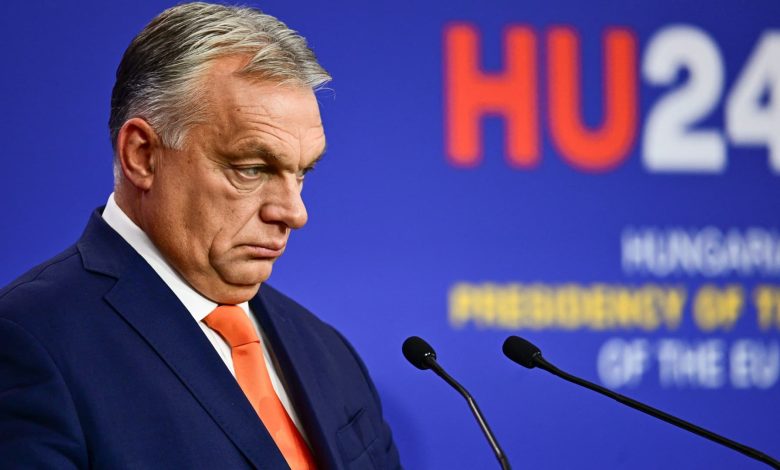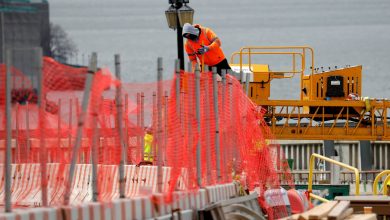‘Strongman’ leaders of Europe don’t look so strong anymore

Hungarian Prime Minister Viktor Orban looks on as he attends a press conference during the informal EU Summit at the Puskas Arena, in Budapest, Hungary, November 8, 2024.
Marton Monus | Reuters
So-called “strongman” leaders of Europe — most of whom are allied with the likes of U.S. President Donald Trump and Russia’s Vladimir Putin — look increasingly weak, analysts say, with their popularity waning ahead of key elections.
Trump’s inauguration was expected to give a shot in the arm to nationalist-populist leaders and parties such as Hungary’s Viktor Orban, Slovakia’s Robert Fico, Germany’s right-wing AfD party and Marine Le Pen and her National Rally party in France. But such a boost is not a foregone conclusion, as domestic pressures and economic challenges weigh on their popularity and power.
“The re-election of Donald Trump for a second term in the U.S. had seemed to be a clarion call for a structural political shift towards similarly populist, MAGA style movements across Europe,” Timothy Ash, senior emerging markets strategist at RBC Bluebay Asset Management, said in emailed comments Thursday. MAGA refers to “Make America Great Again” — a slogan that has historically underpinned Trump’s nationalist campaign.
“Actually what we are seeing is a somewhat mixed picture across Europe, and actually with many of Trump’s apostles being on the back foot,” Ash said.
‘Strongman’ leaders no more?
The leaders of Hungary and Slovakia – President Viktor Orban and Prime Minister Robert Fico – are often classed as being of the “strongman” variety and akin to President Putin, with whom they have continued to have warm relations since Russia’s invasion of Ukraine in 2022.
Though European Union members, both countries have pushed back against the bloc’s initiatives to cut ties with Moscow, such as reducing imports of Russian gas and oil. The nations have instead opted to maintain supplies amid fears of mounting energy costs at home.
Both leaders have also been vocally critical of giving more military and financial assistance to Ukraine and have threatened to refuse to back an extension of sanctions on Russia although, last Monday, Orban backed down from that position after being given energy security assurances by the bloc.
In this pool photograph distributed by Russian state agency Sputnik, Russia’s President Vladimir Putin (R) shakes hands with Slovakia’s Prime Minister Robert Fico (L) prior to their talks in Moscow on December 22, 2024.
Gavriil Grigorov | Afp | Getty Images
Orban and Fico are seeing dwindling popularity ratings at home and rising dissatisfaction with their leadership among the public and in parliament. Orban’s poll ratings have been falling, while those of his main political rival Péter Magyar have been on the rise. Fico, meanwhile, narrowly avoided a vote of no confidence motion in January after his political opponents abandoned the move.
Both men could face defeat at the ballot box in the near-future, analysts say, with parliamentary elections due to be held next year in Hungary, and in 2027 in Slovakia — although a vote could take place earlier given a deepening political crisis for Fico in which his government looks increasingly vulnerable.
“Despite the opposition’s withdrawal of a no-confidence motion earlier in January, last week Prime Minister PM Robert Fico saw his governing coalition lose its majority in parliament after four MPs withdrew their support,” Andrius Tursa, Central and Eastern Europe advisor at risk consultancy Teneo, said in emailed comments Monday.
“In addition, Fico faced some of the largest public protests since 1989 in opposition to his government’s increasingly pro-Russian foreign policy. More demonstrations are planned this week. In the meantime, the latest opinion polls show that opposition Progressive Slovakia has overtaken SMER-SSD [Fico’s left-wing populist party] as the most popular party in the country,” Tursa added.
European Commission President Ursula von der Leyen, Hungarian Prime Minister Viktor Orban and European Council President Charles Michel pose following a press conference during the informal EU Summit at the Puskas Arena, in Budapest, Hungary, November 8, 2024.
Marton Monus | Reuters
Meanwhile, in Hungary, Fico’s ally Orban is under increasing domestic pressure this year, with the rapid increase in popularity of opposition leader Peter Magyar and his Tisza Party.
Various opinion polls since November have showed Tisza pulling ahead of Orban’s Fidesz party, with 35%-45% support among decided voters — about four to six percentage points ahead of Fidesz. If that trend continues, anti-EU populist Orban could lose the 2026 election.
“Orban and Fidesz’s media are relentlessly emphasizing his international and diplomatic importance through his contacts with Trump, Russian President Vladimir Putin, and Chinese President Xi Jinping, as well as his ‘wise’ peace efforts in the Ukraine war and the ostensible great diplomatic achievements of Hungary’s EU presidency,” analysts at the political risk consultancy Eurasia Group said in a note in January.
“But the reality is that Orban is facing his most difficult year since first coming to power in 2010. This will further undermine his ability to hijack — let alone drive — the EU’s agenda as the bloc’s preeminent populist leader,” they added.
A reprieve for Brussels?
Populist parties across the EU have gained significantly in popularity over the last decade, with the rise in prominence of Germany’s AfD party and France’s National Rally — both of which, after undeniable electoral successes, now wield considerable influence over the respective policy directions of their national governments.
Euroskepticism and anti-immigration sentiment was largely fueled by public dissatisfaction with the EU’s response to undocumented migration to the continent.
Joint Press Conference of President of the European Commission Ursula von der Leyen, President of the European Council Antonio Costa and Prime Minister of Hungary Viktor Orban after the end of the European Council Summit, the meeting of the EU leaders at the headquarters of the European Union in Brussels, Belgium on December 19, 2024.
Nurphoto | Nurphoto | Getty Images
Forthcoming elections in Germany, Austria and the Czech Republic could see populist anti-EU parties gain more ground this year, but anti-EU governments will remain well short of the blocking minority needed in the European Council to seriously upset EU decision-making, Eurasia Group noted:
“Where they are in government, they have tended to shift toward the political center, with the notable exception of Hungary. Much of the far right’s prospects will therefore depend on whether governments can find more effective ways to deal with the slow-burning migration crisis that is the strongest driver of populist support in the EU,” analysts said.



